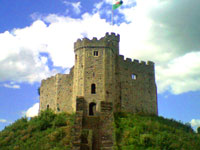Airport
Rhoose Cardiff International Airport
IATA Code: CWLLocation: The airport is located 12 miles (19km) southwest of Cardiff city centre.
Time: GMT (GMT +1 from last Sunday in March to Saturday before last Sunday in October).
Contacts: Tel: +44 (0)1446 711 111.
Transfer to the city: The Cardiff buss service (X91) runs every two hours during the day, seven days a week. (Tel: 029 2066 6444). Journey time to Cardiff from the airport is approximately 35 minutes and bus fare is approximately £3.40 one way. A rail link connects Cardiff International Airport to Cardiff Central and Bridgend. Trains run each direction every hour daily (every two hours on Sunday) with onward connections possible to other destinations on the rail network. A shuttle connects from the airport to the nearby train station (Tel: 0845 748 49 50). The official airport taxi operator, Checker Cars, has a desk in the arrivals hall. Approximate fare to Cardiff City Centre is £26 (Tel: 01446 711747).
Car rental: Avis, Europcar and Hertz are represented at the airport.
Facilities: Facilities include a bureau de change, ATMs, baby changing facilities, faxing and photocopying, game zones, duty-free shops, restaurants, cafés and bars. There are also facilities for disabled passengers; those with special needs are advised to inform their airline or travel agent in advance.
Parking: Short-term parking is right outside the terminal building, and fees range from £1 for the first 20 minutes to roughly £3.10 per hour. Long-term parking is further away from the terminal but is serviced by a free shuttle. Long-term rates are £17.50 for one day, £60.50 for a week, and £106.50 plus £5.50 per extra day for stays over 15 days. There are no pre-booking facilities, but the airport guarantees that space will be available for all cars.
Departure tax:
Website: www.tbicardiffairport.com
Visit worldtravels.com for the full guide to Cardiff. Build a complete Cardiff travel guide and email to your clients - sign up for a trial subscription of World Travels Pro.
Cardiff

Although occupied since the Middle Ages, Cardiff really came into its own during the Industrial Revolution as an important dock town used for the distribution of iron and coal in Wales. Since becoming the Welsh capital in 1955 and subsequently the seat of the Welsh National Assembly, Cardiff has undergone a massive transformation from a forgotten industrial port to a modern capital.
Nowhere is the growth and development of the city more evident than in the Cardiff Bay area, a massive new commercial development and urban regeneration project. The trendy waterfront district known as Mermaid's Quay is home to striking modern architecture and modern art, as well as chic shops and boutiques, top-class restaurants, and plenty of clubs and bars. The Quay also provides a great launch site for numerous cruises and boat tours, ranging from serene paddleboats to thrilling speed boat rides.
These modern amenities lie alongside some impressive historical sites, including the Cardiff Castle, which was built by the wealthy third Marquis of Bute. The castle is located in the centre of Cardiff on a site used by both the Romans and the Normans as a strategic point of defence. Visitors can still explore the Norman Keep, set on top of a small hill overlooking the city.
Other popular attractions in Cardiff include the National Museum and Gallery, St David's Hall, Llandaff Cathedral, the outdoor Museum of Welsh Life and the Millennium Stadium - the new home of the Welsh Rugby Union and future host of soccer matches at the 2012 Olympics. There are also many historical attractions and points of interest just outside the city, including several Neolithic sites, and the area is also resplendent with natural beauty.
This fast growing urban centre may seem an unlikely tourist destination, but more and more travellers are flocking to enjoy the sights, sounds and 24-hour buzz of the Welsh capital.







